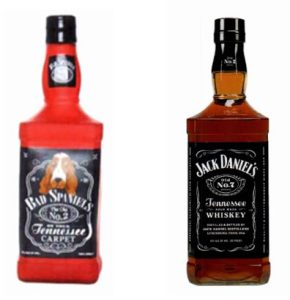Client Alerts
“Bad Spaniels” Supreme Court Ruling Sheds Light on Trademark Parodies
June 2023

Client Alerts
“Bad Spaniels” Supreme Court Ruling Sheds Light on Trademark Parodies
June 2023
On June 8, 2023, the Supreme Court of the United States unanimously sided with Jack Daniel’s and overturned the Ninth Circuit in a trademark infringement and dilution case stemming from VIP Products’ “Bad Spaniels,” a novelty dog toy that intentionally parodied Jack Daniel’s iconic Tennessee whiskey bottle and label elements.[i] The decision clarifies that when a parody of another’s trademark is used as a trademark, the Rogers test for balancing First Amendment and trademark rights does not apply, and the use does not qualify as “noncommercial” for a statutory bar against a claim of dilution.
Balancing Trademark Rights and the First Amendment
A trademark is “any word, name, symbol, or device, or any combination thereof” used to “identify and distinguish” one’s goods or services.[ii] Trademarks perform a key function of identifying the source of a product, thus enabling businesses to build goodwill and consumer recognition with consistently high quality products and are an essential tool in any businesses’ intellectual property arsenal. Similarly, trademark law protects distinctive elements of packaging designs as “trade dress.”
Trademark infringement is the unauthorized use of a trademark or trade dress that is “likely to cause confusion, or to cause mistake, or to deceive.”[iii] In addition, owners of famous trademarks (that is, marks that are household names) may bring a claim for trademark dilution. “Dilution by tarnishment” occurs when the unauthorized use harms the reputation of a famous mark through negative association, while “dilution by blurring” occurs when the unauthorized use weakens the distinctiveness of a famous mark.[iv]
Some companies who sell parody products have countered claims of infringement with the argument that because the product is an expressive work, the Rogers test applies. The Rogers test shields use of a mark in an expressive work under the First Amendment, unless (1) the use of the trademark is not “artistically relevant” to the work, or (2) the trademark is used to “explicitly mislead” the public as to the source or content of the work.[v] If the court finds that Rogers applies and the work passes the test, the trademark infringement inquiry ends; however, if the court finds that Rogers does not apply, the court or jury will then apply the ordinary trademark infringement test, which weighs the similarity of the trademark owner’s and alleged infringer’s marks, the similarity of respective goods or services, and the marketplace conditions to determine whether consumer confusion is likely. Some courts have found that parodic products are not likely to cause consumer confusion under this analysis without considering Rogers.
The Trademark Dilution Revision Act likewise incorporates protections for free speech, including a safe harbor that bars dilution claims against fair use, news reporting or commentary, or “any noncommercial use of a mark.”[vi]
Chewy Vuiton: Fourth Circuit Rules Successful Parody Leads to No Infringement
This is not the first time that dog toy parodical products have been at the center of trademark infringement litigation. In 2007, the Fourth Circuit ruled in favor of Haute Diggity Dog, the maker of “Chewy Vuiton,” a dog toy that was a parody of Louis Vuitton bags.[vii] Like VIP Products, Haute Diggity Dog sold a line of chew toys parodying famous brands, from “Chewnel No. 5” to “Dog Perignonn,” and employed similar designs in their toys to that of the brand they were parodying (with altered spelling of parodied marks). However, the Fourth Circuit did not consider whether the dog toy is an expressive work under Rogers, but instead considered whether the dog toy is a parody under Fourth Circuit case law, such that a modified version of the trademark infringement test applies.[viii] Under the Fourth Circuit test, parodies “must convey two simultaneous – and contradictory – messages: that it is the original, but also that it is not the original and is instead a parody.”[ix] The Fourth Circuit concluded Chewy Vuiton was a successful parody and applied its modified trademark infringement test, finding that the use was not infringing.
Bad Spaniels: Ninth Circuit Rules Parody Product Protected by First Amendment
VIP Products created a line of parodical chew toys designed to imitate well-recognized bottled sodas and alcoholic beverages. Ranging from “Doggie Walker” to “Panta,” the toys play off of recognizable marks. The chew toy at issue was the “Bad Spaniels,” a play on the iconic Jack Daniel’s bottle design, word marks, and stylized logos, which are registered trademarks. Released in 2013, the toy employed a similar label and shape as the Jack Daniel’s bottle, with humorous alterations (e.g., “Jack Daniel’s” is replaced with “Bad Spaniels,” “Old No. 7 Brand Tennessee Sour Mash Whiskey” is replaced with “Old No. 2, on your Tennessee Carpet” and alcohol content descriptions with “43% POO BY VOL” and “100% SMELLY” – the latter statements being the basis of the tarnishment claim) and an image of a spaniel on the front, as well as a tag on the back that stated that the product was not affiliated with Jack Daniel’s. VIP claimed trademark rights in its parodied marks, which later precluded it from arguing that the parodied designs and words were not used in a trademark sense.

Jack Daniel’s demanded that VIP stop selling the toys and VIP responded by suing for declaratory judgment, arguing that there was no trademark infringement or dilution. The district court rejected VIP’s First Amendment argument, finding that the dog toy is “a somewhat non-expressive, commercial product” so that Rogers does not apply.[x] The Ninth Circuit reversed, finding that the dog toy was an expressive work because it communicates a humorous message and the “fact that VIP chose to convey this humorous message through a dog toy is irrelevant.”[xi] The Ninth Circuit cited Louis Vuitton, noting that the Fourth Circuit’s parody analysis supports its conclusion that the dog toy is an expressive work and is also “noncommercial” such that the dilution claim is barred.[xii] The case was then remanded back to district court with instructions to apply Rogers, which it did, ruling for VIP and lamenting that “it appears nearly impossible for any trademark holder to prevail under the Rogers test.”[xiii] The Ninth Circuit summarily affirmed that ruling on appeal, and the Supreme Court took up the case in November 2022.
Supreme Court’s Ruling and Implications
Without deciding whether Rogers has merit in other contexts, the Supreme Court held that it does not apply when the allegedly infringing use functions as a trademark – that is, a designation of source.[xiv] However, the Supreme Court noted that the trademark infringement inquiry, which assesses likelihood of consumer confusion, is “not blind to the expressive aspect” of parodic works because consumers “are not so likely to think that the maker of a mocked product is itself doing the mocking.”[xv] Trademarks often have an expressive element, the Supreme Court wrote; however, the likelihood-of-confusion inquiry accounts for the interest in free expression in the context of branding.[xvi] Likewise, the Court concluded that trademark use is not “noncommercial” for the purpose of dilution, as only uses that do not function as a source identifier qualify for the safe harbor.[xvii]
This decision will be celebrated by brand owners and provides much-needed clarity at a time when Rogers has been increasingly invoked in cases dealing with both physical and virtual goods. Last year, the design studio MSCHF argued that Rogers should apply to its “Wavy Baby” sneakers that allegedly parodied Vans shoes, but the Eastern District of New York rejected this argument. MSCHF appealed the ruling to the Second Circuit.[xviii] In contrast, the Southern District of New York found that Rogers was implicated in the case of “MetaBirkins” NFTs that parodied Birkin handbags, though a jury ultimately rejected the First Amendment defense and found for plaintiff Hermès on the trademark infringement and dilution claims.[xix]
Takeaways
- Protect your brand: For brand owners, obtaining protection for key trademarks and designs, including trade dress, is key to enforcing those rights in federal court.
- Search thoroughly: Before adopting new trademarks, perform a thorough search of both registered and unregistered marks.
- Do not count on “fair use” or “parody” defense when developing a brand: While it is possible to reference another brand in competitive advertising or in other “fair use” scenarios or artistic works, referencing another brand in your own branding is highly risky. It remains to be seen how courts will weigh parodic or expressive elements of trademarks in infringement analysis after this decision; however, litigating such a claim can be very costly.
- The benefit of fame: Know that famous trademarks enjoy additional protection under anti-dilution provisions of the Lanham Act.
If you have questions about trademarks, parodies, or the First Amendment, please contact a member of our team.
[i] Jack Daniel’s Properties, Inc. v. VIP Prod. LLC, No. 22-148, 2023 WL 3872519, at *1 (U.S. June 8, 2023).
[ii] 15 U.S.C § 1127.
[iii] 15 U.S.C. §§ 1114, 1125.
[iv] 15 U.S.C. § 1125(c)(2)(B)-(C).
[v] Rogers v. Grimaldi, 875 F.2d 994, 999 (2d Cir. 1989).
[vi] 15 U.S.C. § 1125(c)(3).
[vii] Louis Vuitton Malletier S.A. v. Haute Diggity Dog, LLC, 507 F.3d 252 (4th Cir. 2007).
[viii] Id., at 261.
[ix] Id., at 260, quoting People for the Ethical Treatment of Animals v. Doughney, 263 F.3d 359, 366 (4th Cir.2001).
[x] VIP Prod. LLC v. Jack Daniel’s Properties, Inc., 953 F.3d 1170, 1173 (9th Cir. 2020).
[xi] Id., at 1175 (internal citations omitted).
[xii] Id.
[xiii] VIP Prod. LLC v. Jack Daniel’s Properties Inc., No. CV-14-02057-PHX-SMM, 2021 WL 5710730, at *6 (D. Ariz. Oct. 8, 2021), aff’d, No. 21-16969, 2022 WL 1654040 (9th Cir. Mar. 18, 2022).
[xiv] Jack Daniel’s, No. 22-148, 2023 WL 3872519, at *6 (U.S. June 8, 2023)
[xv] Id.
[xvi] Id., at *9.
[xvii] Id., at *11. Notably, Justices Sotomayor and Alito wrote a concurrence emphasizing that in parody cases, courts should be cautious in interpreting survey results and carefully assess the methodology and representativeness of such surveys. Justices Gorsuch, Thomas, and Barrett wrote a brief concurrence emphasizing that lower courts should apply Rogers with care, noting that the Solicitor General raised “serious questions” about the decision in its amicus brief. Id., at *11-12.
[xviii] Vans, Inc. and VF Outdoor, LLC v. MSCHF Product Studio, 22-cv-2156, 602 F.Supp.3d 358, 2022 WL 1446681 (E.D.N.Y. April 29, 2022) appeal filed, No. 22-1006 (2d Cir.).
[xix] See Hermes Int’l v. Rothschild, 603 F. Supp. 3d 98 (S.D.N.Y. 2022).
Note: Thaara Shankar, a Tucker Ellis Summer Associate in Los Angeles, contributed to this Client Alert.
ADDITIONAL INFORMATION
For more information, please contact:
- Dina Roumiantseva | 415.617.2132 | dina.roumiantseva@tuckerellis.com
- Steven E. Lauridsen | 213.430.3308 | steven.lauridsen@tuckerellis.com
- David J. Steele | 213.430.3360 | david.steele@tuckerellis.com
- Helena M. Guye | 213.430.3038 | helena.guye@tuckerellis.com
This Client Alert has been prepared by Tucker Ellis LLP for the use of our clients. Although prepared by professionals, it should not be used as a substitute for legal counseling in specific situations. Readers should not act upon the information contained herein without professional guidance.

